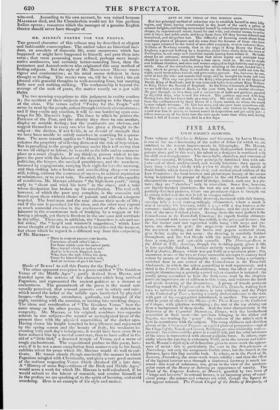MR. MILNES ' S POETRY FOR TILE PEOPLE.
THE general character of this volume may be described as elegant and fashionable commonplace. The author takes an historical inci- dent, an anecdote of domestic life, some occurrence which has happened or might have happened to himself; and puts them into verse ; that verse possessing more refined, perhaps more imagi- native sentiments, and certainly better-sounding lines, than the poetasters and Annual-writers who originated this easy method of finding subjects. But the style of Mr. MosicKTos, Almsns wants vigour and condensation; as his mind seems deficient in deep thought or feeling. The reader runs on, till he is tired; his ear pleased with graceful thoughts in well-sounding lines, but meeting little new and nothing striking. The workmanship is beyond the average of the mob of poets, the matter mostly on a par with theirs.
The two seeming exceptions to this judgment in reality confirm it ; the accident of their subjects only appearing to take them out of the class. The verses called "Poetry for the People " will never be read by the people, unless through extrinsic circumstances ; and if they excite any emotion, it will be one bordering upon con- tempt for Mr. 'Army ms's logic. The lines in which he praises the Patience of the Poor, and the charity they show to one another, display an amiable feeling ; but the sentiments are obvious, and suggest themselves to every one who has given a thought to the subject : the diction, if not feeble, is so devoid of strength that we have been unable to satisfy ourselves in searching fbr a quota- tion. The same remark applies to "Almsgiving," in which he in- culcates the propriety of relieving distress at the risk of imposition. But in preaching to the people patience under their toil seeing that we are all obliged to labour, he is as old as the hills and as common- place as a court chaplain. If any thinking person wished to im- press the poor with the labours of the rich, he would show him the politician, the lawyer, the medical practitioner, and the merchant, harassed by engagements, carrying their vigils fir into the morning, and then sinking into a broken and t-wells:siting sleep—or worse still, toiling, without the assurance of success, to achieve reputation or subsistence, or to avert ruin. To satisfy the poor of the equality of conditions, Mr. AilLNES adduces " the high-born youth," rising early to " shout and wind his horn " in the chase, and a rake whose dissipation has broken np his constitution. The real evil, however, of which the poor may complain, is the excessive toil forced upon them without choice of pursuit and without adequate requital. The huntsman and the roue choose their mode, of life ; and if the one is punished fir his vices, mid the other may expend as much muscular exertion in the excitement of the chase as the labourer in the monotonous task of trudging by a waggon or fol- lowing a plough, yet there is freedom in the one case and servitude in the other. There are, in addition, the " houseless hats and un- fed sides," the " loop'd and window'd raggedness," which Lear never thought of till he was overtaken by troubles and the tempest, but about which he argued in a diflixent way from this outpouring of Mr. MILNES- " Then in content possess your hearts,
Unenvious of each other's lot,— For those which ,ecm the easiest parts Have travail u hid, ye reckon not : And he is bravest, happiest, best, Who, from the task within his span, Earns fir himself his evening rest, And an increase of geed for man."
Shade of Iluaxs! to call this Poetry for the People I
The other apparent exception is a poem entitled " The Goddess Venus of the Middle Ages" ; partly derived from IlErsio, and founded upon the notions of her character which long survived Paganism, and represented the ancient goddess as a dannon or enchantress. The groundwork of the poem is the moral uni- versally perceived, that sensual pursuits end in satiety and ruin : which moral the belief of the middle ages inculcated by physical images,—the beauty, attendants, garlands, and banquet of the night, vanishing with the morning, or turning into revolting shapes. The ideas and versification of " The Goddess Venus" hear the same stamp as his other poems, but the scheme is deficient in congruity. Mr. MI LNES, or his original, combines t wo opposite schools in one subject—the mental or metaphysical ideas of the present time with the physical superstition of the darker ages. Having shown his knight tempted to long idleness and enjoyment by the spring season and the beauty of Italy, his weakness in- creasing with each day's indulgence, it would have been more fit to have seduced him by a mortal courtezan, than to have called in the aid of a" little bird," a deserted temple of Venus, and a scene of magic enchantment. The expositional prefitee to this poem, how- ever, if it be not a mere compilation front matter ready to his hand, exhibits talent for prose which Mr. MILNES would do well to cul- tivate. Ile traces clearly though succinctly the manner in which Paganism mingled with Christianity, and gives a very good account of the notions respecting Venus which obtained till a late date. A "History of some Superstitions of the Dark and Middle Ages," would seem a work for which Mr. MILNES is well calculated, if he would submit to the labour of research, and confine himself, as in the preface we are speaking of, to the spirit of learning, and avoid overdoing. Here is an example of his style and matter.


























 Previous page
Previous page